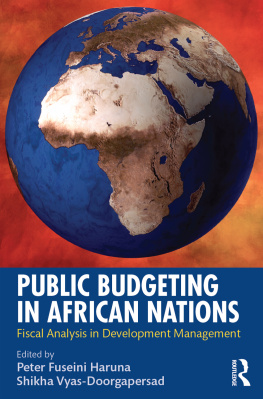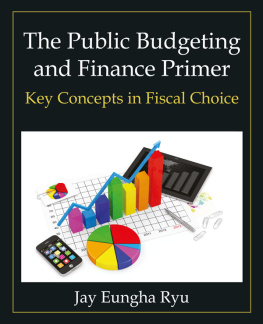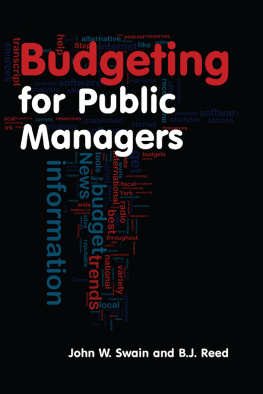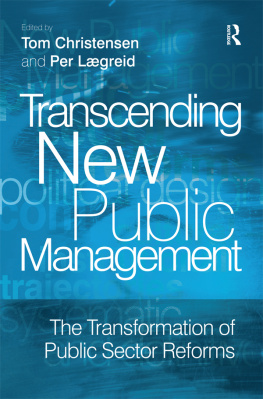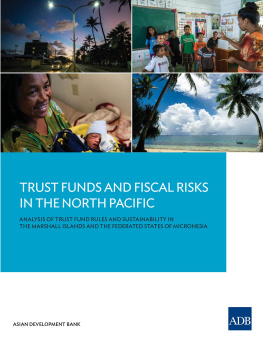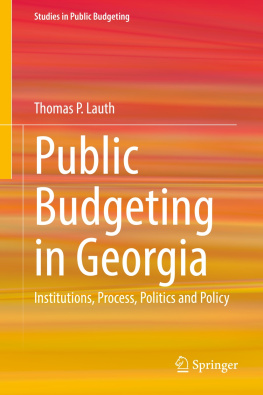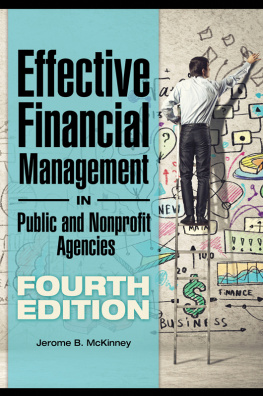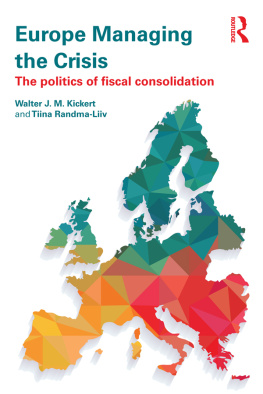Public Budgeting in African Nations
Public Budgeting in African Nations offers essential budgeting and fiscal policy management information to development practitioners interested in improving governance and the performance of government. It shares timely regional and cross-cultural experiences with international audiences and gives reflective attention to comparative budgeting and fiscal policy management.
This book adopts an interdisciplinary and pragmatic approach to analyzing research findings on public budgeting as a sustainable development tool, revealing that development practice benefits most from bottom-up, decentralized tactics of budgeting and fiscal policy, with the involvement of national, subnational, and civil society institutions. The chapters in this volume together demonstrate that a balanced budget should draw from and reflect values and priorities across the full spectrum of social and political life.
Peter Fuseini Haruna is Professor of Public Administration at Texas A&M International University, USA and a 20102011 Fulbright Senior Scholar to Ghana.
Shikha Vyas-Doorgapersad is Professor of Public Management and Governance at the University of Johannesburg, South Africa.
Public Budgeting in African Nations
Fiscal Analysis in Development Management
Edited by
Peter Fuseini Haruna and
Shikha Vyas-Doorgapersad
First published 2016
by Routledge
711 Third Avenue, New York, NY 10017
and by Routledge
2 Park Square, Milton Park, Abingdon, Oxon OX14 4RN
Routledge is an imprint of the Taylor & Francis Group, an informa business
2016 Taylor & Francis
The right of the editors to be identified as the authors of the editorial material, and of the authors for their individual chapters, has been asserted in accordance with sections 77 and 78 of the Copyright, Designs and Patents Act 1988.
All rights reserved. No part of this book may be reprinted or reproduced or utilised in any form or by any electronic, mechanical, or other means, now known or hereafter invented, including photocopying and recording, or in any information storage or retrieval system, without permission in writing from the publishers.
Trademark notice: Product or corporate names may be trademarks or registered trademarks, and are used only for identification and explanation without intent to infringe.
Library of Congress Cataloging in Publication Data
Names: Haruna, Peter Fuseini, editor. | Vyas-Doorgapersad, Shikha, editor.
Title: Public budgeting in African nations : fiscal analysis in development management/edited by Peter Fuseini Haruna and Shikha Vyas-Doorgapersad.
Description: New York: Routledge, 2016. | Includes bibliographical references and index.
Identifiers: LCCN 2015036306| ISBN 9781498742139 (cloth: alk. paper) | ISBN 9781315637273 (ebook)
Subjects: LCSH: Finance, PublicAfrica. | BudgetAfrica. | Fiscal policyAfrica. | Public administrationAfrica. | Economic developmentAfrica.
Classification: LCC HJ1441 .P83 2016 | DDC 352.4/8096dc23LC record available at http://lccn.loc.gov/2015036306
ISBN: (hbk) 978-1-4987-4213-9
ISBN: (ebk) 978-1-315-63727-3
Typeset in Goudy
by Florence Production Ltd, Stoodleigh, Devon, UK
Contents
PETER FUSEINI HARUNA
TAOLO B. LUCAS AND THEOPHILUS T. TSHUKUDU
PETER AJONGWA NGWAFU AND VIVIANE E. FOYOU
LLOYD G. ADU AMOAH
FRANK L. KWAKU OHEMENG
ABEL KINOTI MERU AND ROGERS KINOTI MARIBA
HAPPY MICKSON KAYUNI
GERRIT VAN DER WALDT AND SHIKHA VYAS-DOORGAPERSAD
BENON C. BASHEKA
GIDEON ZHOU, RICKY MUNYARADZI MUKONZA, AND HARDLIFE ZVOUSHE
DOMINIQUE E. UWIZEYIMANA
DENIS J. KAMUGISHA AND JOHN S. KIHAMBA
PETER FUSEINI HARUNA AND SHIKHA VYAS-DOORGAPERSAD
Figures
Budgeting Phases of National
and Sub-national Units |
Tables
There is a general consensus among economists that the budget is the meeting point between politics and reality. This is underscored by the tripartite role the budget is designed to play as a tool for enhancing macro-economic stability, communicating public policy, and translating government policies and programs into action. In the post-independence African context, in particular, the budget is expected to be the most important instrument through which government at all levels delivers the dividends of good governance such as reducing poverty and unemployment, and sustaining the pace of economic growth and development. The budget is the means by which governments provide public services and fulfill the goals and aspirations of their citizens. In a democracy, these goals and aspirations are often embodied in the election manifestos of the political parties that end up forming the governments; and are enacted by parliaments through annual appropriations. In authoritarian and non-democratic societies, budgets are enacted through decrees.
In an ideal world, public expenditure has to be effectivethat is, it must achieve its purposes on time and with due regard to quality. This includes timely completion of infrastructure programs. Public expenditure has to be efficient. This includes completing projects and delivering services within the budget allocatedalso called value for money. Public expenditure has to be relevant. This implies being directly related to its purpose, and not tangential. Public expenditure has to be sustainable. Sustainability implies the ability of government to incur the level of public expenditure that is approved or enacted by the legislatures, over a reasonable period. Such level of expenditure may be financed through taxation, external borrowing, and grants. Public expenditure has to involve partnership between the government and the public, as well as between the government and its development partners. The practice of public expenditure must include continuous learning. This means that lessons must be learned and sharedwithin the government and between practitioners and academicians. Learning must also be shared between advanced nations and developing nationsin part to avoid making the same mistakes over and over. Public expenditure must be transparent and ethical in order to help the various stakeholders feel confident that tax gathered is being used with due regard to safe-guarding the public interests. Finally, in order to be truly owned by the citizens, public expenditure decisions should ideally be formulated through a participatory process.
Unfortunately, in 2015 after many decades of independence, most African economies are yet to use the budget to harness their huge mineral and natural resource endowments to realize their economic potentials. This book does an impressive job of investigating this phenomenon in a scholarly fashion and provides a workable solution to the issue of how governments budgets can best be adapted to foster inclusive growth and economic development in Africa. This compilation of the historical experiences in a sample of African countries will help enhance the understanding required to develop budgets that are sustainable, aligned with international best practice and most importantly, provide effective domestic economic development policy that takes into full consideration its socio-cultural environment.
The case studies drawn across many African economies are rich in content, academically robust, practical in context and intellectually engaging. The authors generally argue that development occurs in specific contexts and that in African nations, that context and landscape encompass historical legacies of slavery and colonialism, as well as unique economic, social, political, and cultural experiences. This fact is often ignored in economic policy blueprints in Africa, which in turn underpins most public financial management systems. Thus this kind of work is much needed as Africa grapples with the challenges of development and will go a long way to contribute towards the enhancing of knowledge and understanding of the use of public budgeting in accelerating socio-economic development in the African continent. This book makes significant contributions towards expanding our theoretical and empirical understanding of public expenditure formulation and management.


